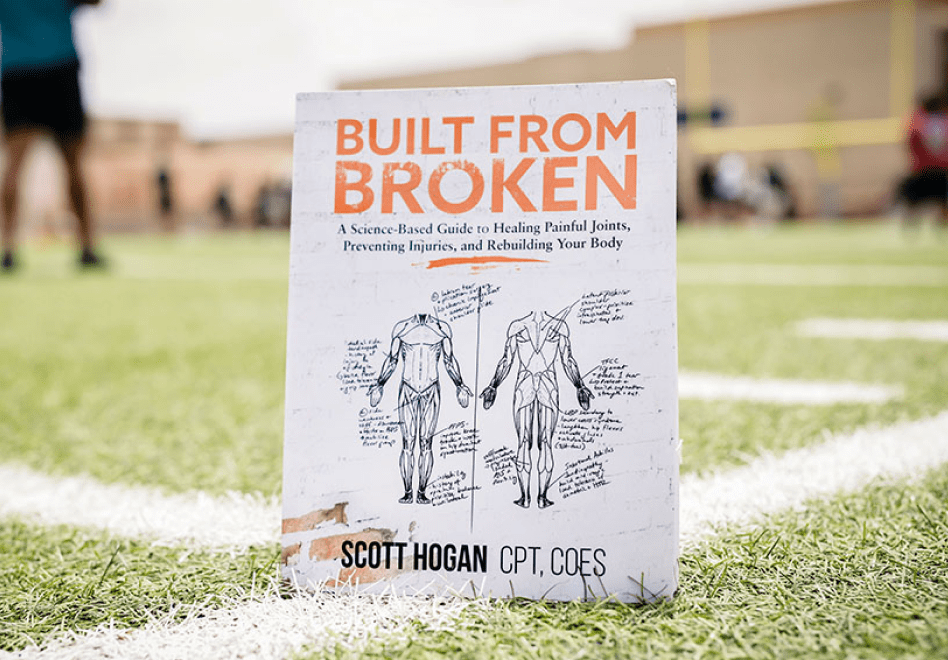
Be built (to last).
The right supplements can help you recover naturally and build a resilient body.

Supplement Quiz
Take this short quiz to discover the perfect supplements for your needs and goals.
About SaltWrap

Built from Broken
Get the best-selling book from SaltWrap founder, Scott Hogan, and start rebuilding today.
The Truth About Artificial Sweeteners
by Scott Hogan, ACE-CPT, COES
“Zero calories.” “Better for you than sugar.” “Guilt-free.”
These are a few of the promises of artificial sweeteners — the kind you find in diet sodas, flavored waters, many protein powders, and even “healthy” snacks.
Today, they’re more common than they’ve ever been.
Yet in the last decade or so, many natural health experts have linked artificial sweeteners to virtually every disease known to man.
Most of these claims are overblown. But that doesn’t mean they’re entirely false, either.
Here’s the uncomfortable truth about artificial sweeteners: Your body doesn’t care what the label on your food says.
When you eat or drink something sweet, your body reacts as if you just downed a spoonful of sugar.
And that reaction can quietly throw your appetite — and your fat-loss efforts — off track.
How Artificial Sweeteners Trigger a Metabolic Response
When you eat sugar, your body releases insulin. In short, it’s a hormone the pancreas makes to help shuttle glucose (sugar) from your bloodstream into your cells for energy.
That’s normal and healthy — in the right context. But here’s the problem:
When you drink or eat something artificially sweetened, your body often releases insulin even though there’s no sugar to process.
This can leave your blood sugar lower than it was before.
Lower blood sugar might sound like a good thing. But when this happens, your body starts sending emergency signals: “We need food — now.”
The result? You start craving carbs, sweets, or anything that will bring your blood sugar back up quickly.
This is what researchers call the rebound effect — and it’s why artificial sweeteners can quietly increase your total calorie intake even if they contain zero calories themselves.

Several studies have observed that people who consume more artificial sweeteners tend to overeat later in the day.
Not because these sweeteners “cause” obesity or disease, but because they mess with your hunger and reward systems.
Your body expects energy (calories) when you taste sweet things.
When it doesn’t get that energy, your brain compensates by ramping up cravings — often leading to overeating or snacking on highly processed foods.
So, while the “zero-calorie” label looks good on paper, it’s likely setting you up for metabolic confusion later.
How To Avoid the Sweetener Trap
You don’t need to swear off all artificial sweeteners. Just be strategic.
Here’s how to keep them from sabotaging your results:
Track Your Intake
You’d be surprised where sweeteners hide — protein powders, energy drinks, electrolyte mixes, even some “natural” supplements. Track your daily exposure for a week and see where you can cut back.
Pair Them With High-Protein, Low-Carb Foods
Eating nutrient-dense, high-protein, low-carb foods within an hour or two of consuming artificial sweeteners can help stabilize blood sugar and reduce any rebound cravings.
Examples: Greek yogurt, a (naturally sweetened) protein shake, a handful of raw nuts, or a couple of hard-boiled eggs.
Retrain Your Palate
The more you hit the “sweet button,” the more your body will crave sweet foods. Your brain can actually become “wired” for sweets. But gradually reducing your intake of sweets helps reset your taste buds so that natural foods start tasting better — and your appetite becomes easier to control.
Final Thoughts
In reasonable amounts, artificial sweeteners aren’t toxic. A diet soda every now and then isn’t likely to wreck your metabolic health.
That said, there’s no “free lunch” when it comes to artificial sweeteners.
They can influence blood sugar, insulin response, and hunger.
This makes them something to use mindfully, not mindlessly.
If you rely on them to curb bigger sugar cravings, make sure you’re also supporting your body with real, nutrient-dense foods and adequate protein intake.
Because when it comes to health and longevity, the goal isn’t just to cut calories — it’s to optimize performance.
Founder: Scott Hogan

I created SaltWrap to bring together the most practical ideas in therapeutic sports nutrition, corrective exercise, and functional fitness — with the goal of keeping you (and myself) strong, mobile, and built to last.
I've worked as an A.C.E. Certified Personal Trainer, Orthopedic Exercise Specialist, and nutritional supplement formulator.
But more importantly — I've spent most of my life battling injuries, joint pain, and just being plain beat up. So I know what it's like to struggle toward fitness goals.
SaltWrap is here to push you through injuries, setbacks and perceived physical limitations. To a place beyond what you think you're capable of. Sign up here to stay in the loop.
Learn more about my best-selling injury prevention and recovery book, Built from Broken.







